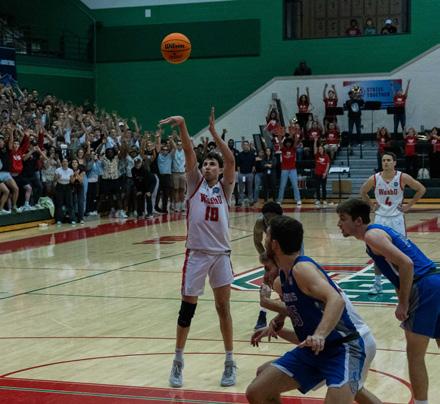
GAME WINNER
Sit-down interview with point guard Yogi Oliff. (Sports, pg 7)

OBITUARY
WashU remembers Amarnath Ghosh. (News, pg 2)
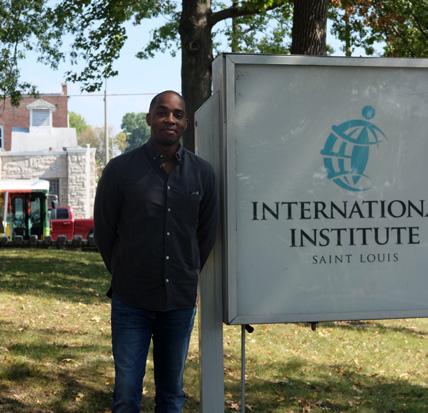
Students stage second protest to demand Prof. Dybvig’s dismissal after sexual misconduct allegations
About thirty students protested outside Olin Professor Phillip Dybvig’s classroom in Simon Hall and demanded his termination following allegations of sexual misconduct in 2022 and 2023. The protest was intended to occur between two successive sections of a course Dybvig teaches, but the class did not meet the day of the protest, Thurs, Feb. 29th.
Dybvig has been accused of sexual harassment by seven former students since receiving the Economic Sciences Nobel Prize in 2022.
During the protest, students marched through the halls of Simon while chanting slogans like “Hear us loud, hear us clear, Dybvig isn’t welcome here,” and held signs with messages such as “A perpetrator teaches here.” After rallying, they staged a sit-in outside Dybvig’s classroom, which lasted for over an hour.
The protest was organized by students affiliated with a range of clubs including MeToo WashU and Asians and Pacific Islanders Demanding Justice. It also received endorsements from six student organizations, including Student Union Senate, Abolish Greek Life, and Girls Excelling in Math and Science.
Sophomore Sonal Churiwal, one of the organizers, said that students plan to continue protesting until Dybvig is terminated from the University.
“We can’t say that we accept the presence of a perpetrator teaching on our campus just because he has a

Nobel Prize,” Churiwal said. Although the protest was scheduled to begin at 3:50 p.m. and continue for the ten minutes in between two sections of Dybvig’s Mathematical Finance course, the classroom was empty.
In an email to Student Life, Julie Flory, Vice Chancellor for Marketing and Communications, wrote that the class was not scheduled during the week of the protest.
“The course was only scheduled for the first part of the semester and it has concluded,” Flory wrote.
Rob Wild, Associate Vice Chancellor for Student Affairs and Dean of Students, said that Dybvig is not on campus this week. Dybvig did not respond to a request for comment about the scheduling of his class.
Churiwal said that the protest was planned for the entirety of his class.
“The class that Dybvig teaches is 1.5 credits, the website reflects that and this week, he normally teaches Tuesday and Thursdays from 4:00 p.m. to 5:20 p.m. in Simon 113,” Churiwal said. “So we’re protesting for the duration of this class outside the classroom.”
On Jan. 16, students held a similar protest in Simon to express their discontent with the University’s handling of the allegations against Dybvig. At both protests, MeToo WashU asked students to sign a petition calling for Dybvig to be fired, which has received almost 1,000 signatures.
Churiwal said that she hopes the protests continue the conversation
about Dybvig’s employment at the University. “It’s important for us to keep talking about the situation and for students to know that Dybvig is continuing to teach here, despite the fact that national media has reported that he harassed seven students,” she said.
Read the rest online:
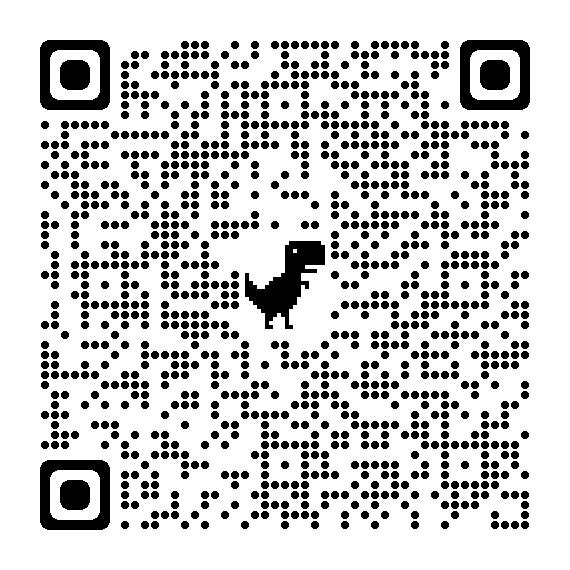
“Survive and Advance:” Men’s basketball moves on to Sweet 16 after two dramatic overtime wins
With 1.8 seconds remaining in overtime, sophomore guard Yogi Oliff stepped up to the free throw line. He needed to hit one shot to keep the Washington University men’s basketball team’s season alive, and two to deliver a win against the Illinois College Blueboys in the second round of the NCAA tournament.
It didn’t help that this was the Bears’ second straight game in overtime, or that Oliff had logged 29 minutes the night before in a 71-68 overtime victory against Wisconsin Lutheran College. It also didn’t help that, despite all of his strengths, the point guard has been struggling from the line all season, hitting just above 60% of his attempts.
“There’s been times this season that I’ve struggled from the line, it’s not a secret,” Oliff said postgame. “But it’s just about staying confident.”
Oliff stayed confident, like the Bears have all year in clutch situations, and sank both shots to give the Bears a 68-67 lead that they would not relinquish. After a failed full-court heave from Illinois College, the rambunctious WashU student section stormed the court as the Bears stamped their ticket to the Sweet Sixteen.
Now, the Bears will look forward to playing the Trine University Thunder next weekend, marking the first time WashU has played past the second round since it won the National Championship in 2009. While the Bears also won their first two tournament games in the 2019-20 season, their third round contest, and the remainder of the tournament, were canceled due to the COVID-19 pandemic.
First round: WashU v. Wisconsin Lutheran College
The Bears tipped off their March Madness journey with a 71-68 overtime victory over the Wisconsin Lutheran College Warriors. The Bears took an early lead, starting the game on a 10-0 run, but the Warriors stayed within touching distance for the entire game. With 11 seconds left in regulation, a Wisconsin Lutheran jumper completed the team’s comeback, forcing an extra period of play to decide the contest.
In overtime, it was the Warriors who seemed to be in control, stopping the Bears on consecutive possessions to secure a three-point lead. With the shot clock winding down and junior guard Hayden Doyle bottled up in the paint, junior guard Kyle Beedon broke loose on the right wing, finding just enough space to loft an offbalance, catch-and-shoot three as
the shot clock expired.
“The last one I hit, it was kind of off balance, but I hit those all the time,” Beedon said in a postgame press conference. “If you practice making tough shots, you’ll feel confident in making them.” After Beedon’s shot swished through the net, the Bears locked in, taking a lead with 46 seconds remaining and holding on for a 71-68 win after four free throws from Doyle, who scored his 1000th career point, sealed the victory.
Like they have all season, the Bears faced adversity, and yet again, persevered for a win.
“In the tournament, it’s all
about surviving and advancing,” said head coach Pat Juckem.
“They don’t ask how, they ask if.” Oliff excelled in the win, hauling in 16 rebounds to lead all players, contributing to WashU winning the rebound battle 53-42. Beedon and sophomore center Calvin Kapral led the team with 17 points each, while Kapral also grabbed six rebounds. Alongside first-year center Jake Davis, Kapral held two-time NACC Player of the Year Ryan Broeckel, who averages over 17 points per game, to just seven points in 45 minutes.
SEE BASKETBALL, PAGE 7
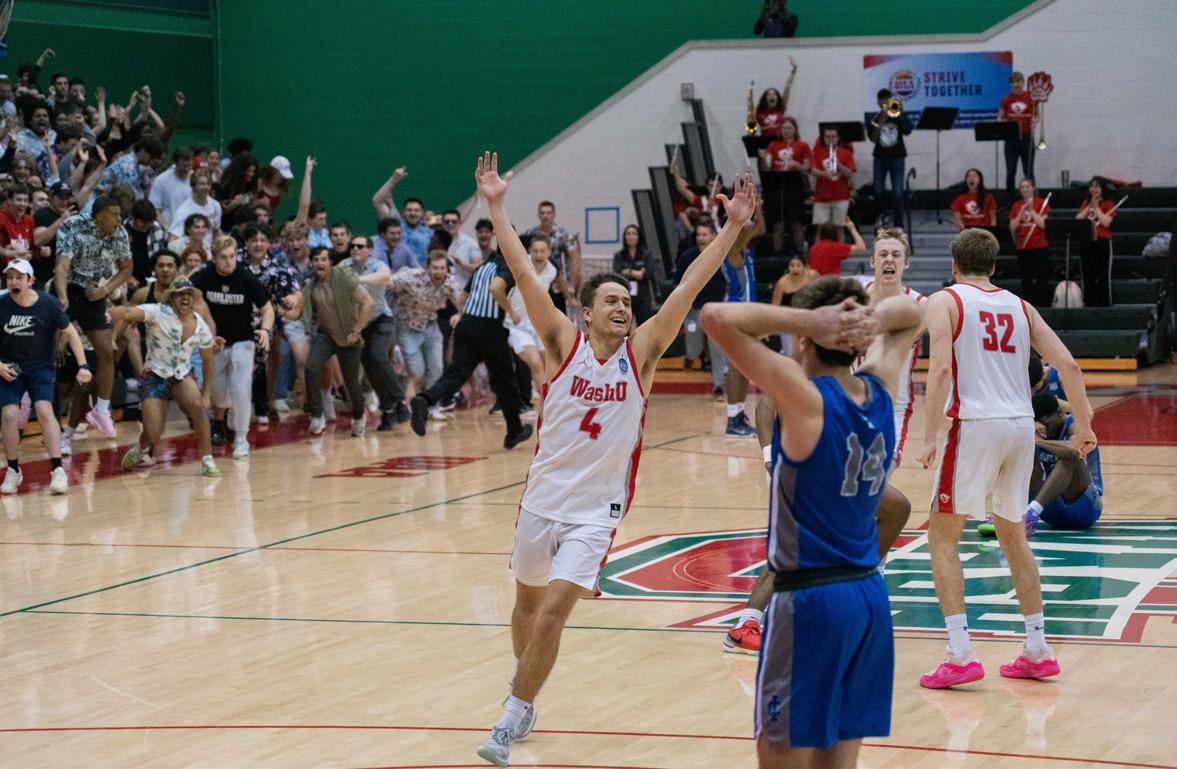
CHANGEMAKER
SPOTLIGHT
New Gephardt fellow facilitator John Worth. (Scene, pg 5)
Student Life Q&A with the Chancellor, 2024
Washington University Chancellor Andrew Martin sat down for an interview with Student Life on March 5, nearly a year after his last Q&A in April 2023. Martin spoke about recent student activism on campus, the state of the endowment, the University’s recent and future property purchases, and where he buys his glasses. The Q&A has been edited for length and clarity.
Student Life: How would you describe the past academic year in one word?
Andrew Martin: Complicated.
SL: Can you expand on that at all?
AM: This academic year has put a great deal of stress on so many members of our community. I think the most salient issue has to do with the tragic events of Oct. 7 and the aftermath, which has affected so many members of this community in so many different ways and at times, sort of pitted members of the community against one another, or at least [created] the perception that members of our community are pitted against one another. And that’s made for a really complicated time.
SL: You’ve taken a stance on some instances of labeling some speech as hateful, [specifically] saying that ‘to the river to the sea’ was ‘well beneath the dignity of every member of our community.’ How do you decide when to weigh in on speech on campus?
AM: In this particular case, this was language that was being used on our campus that was deeply hurtful and intimidating to some members of our community. And in that particular blog post, in partnership with the chairman of the board, we decided that we’re not banning that phrase, but we’re calling it what it is, which is something that was deeply, deeply troubling and offensive to many members of our community.
SL: And sort of on the same topic, there’s an unofficial WashU group known as Resist WashU that has been pretty persistently calling for the university to divest or unaffiliate with Boeing due to claims about the company supplying missiles to Israel. What is your response to this call? And would this divestment or unaffiliation ever happen?
AM: No.
SL: Do you have a particular response to this call and why [unaffliation] wouldn’t happen?
AM: No.
SL: There have also been calls from [student] groups to divest from fossil fuels. Last year, you said that the University does not positively or negatively screen investments, meaning look at ESG ratings. Why does the University not look at ESG ratings?
AM: I certainly appreciate the enthusiasm of some members of the community who are advocating for divestment from fossil fuels. We’ve made the decision that the purpose of the endowment is to generate as much return as possible. We do so in a socially responsible way. That’s all detailed in our annual report and available on the endowment website.
Why do we care about endowment return? Because endowment return is our biggest source of funds for scholarships, and funds our faculty research, and so that’s why we’ve made that decision.
CONTACT BY POST ONE BROOKINGS DRIVE #1039 #320 DANFORTH UNIVERSITY CENTER ST. LOUIS, MO 63130-4899 CONTACT BY EMAIL EDITOR@STUDLIFE.COM NEWS@STUDLIFE.COM CALENDAR@STUDLIFE.COM CONTACT BY PHONE NEWSROOM 314.935.5995 ADVERTISING 314.935.4240 FAX 314.935.5938 The independent newspaper of Washington University in St. Louis since 1878 WWW.STUDLIFE.COM VOLUME 145, NO. 20 THURSDAY, MARCH 7, 2024
ALIANA MEDIRATTA ALIZA LUBITZ
FISHER JUNIOR NEWS EDITOR STAFF WRITER CONTRIBUTING WRITER
JACOB
Students in Simon Hall protest Dybvig’s continued employment on Feb. 29.
ALAN ZHOU | STUDENT LIFE
JACOB RITHOLZ STAFF WRITER
Hayden Doyle celebrates the team’s first second-round win in the fieldhouse in 17 years.
ELLE
SU | STUDENT LIFE
VIA POOLOS EDITOR-IN-CHIEF
SEE CHANCELLOR, PAGE 3
Remembering MFA student and dancer Amarnath Ghosh
ALIANA MEDIRATTA JUNIOR NEWS EDITOR
To his closest friends and colleagues, 34-yearold Amarnath Ghosh could be described in one word, “intensity.” From his gratitude for life, empathy towards others, passion for dance, and curiosity to learn, Ghosh is remembered by his commitment to giving his all to everything he did.
Ghosh was in his final year as an Master of Fine Arts (MFA) student studying dance in Washington University’s Performing Arts Department (PAD) when he was killed on Feb. 27, near the Third Degree Glass Factory on Delmar Blvd, just a few months shy of completing his degree.
Originally from Suri, in West Bengal, India, Ghosh dedicated his life to the study and performance of dance. After graduating from the Kalakshetra Foundation in Chennai and studying dance at the Kuchipudi Art Academy, he became an expert in a range of Indian dance styles, including Bharatnatyam, Kuchipudi, Manipuri and Kathak.
In India, Ghosh received accolades for his work from the International Dance and Music Festival in New Delhi and the International Cultural Ministry in India. He came to St. Louis to study dance at WashU, where he expanded on previous skills and began to study other forms such as ballet, modern, jazz, and dance history.
David Marchant, Professor of Practice in Dance,
described Ghosh as a unique human being and student.
“He had such a purity of joy and enthusiasm and openness to learning new things,” Marchant said. “He was completely, unselfishly there and giving for everyone else.”
Ghosh was in an MFA student cohort with Emily Duggins Ehling and Carol Gonsalves Bertho, who saw him as someone who “lit up the world around him.”
Ehling and Bertho recounted the tight-knit bond they all formed even before Ghosh came to America, saying that they had a group chat where Ghosh would refer to them as his sisters.
“From the beginning we were a family, the three of us,” Ehling said. “We were so overjoyed, having him there. The three of us together made the cohort complete.”
Ehling described him as caring, kind, and funny, the type of person who always wanted to know how they were doing. She said she was also struck by his excitement to learn.
“I think he always wanted to learn something new and every single thing that he learned was the most exciting thing to him,” she said. “Every day in class there was something that would make him say, ‘Wow, this was beautiful.’”
Bertho said that Ghosh was unashamed to show his gratitude for his education.
“What I remember the most was how grateful he was in every class, how he was not ashamed of
thanking every professor as many times as he felt that he could,” Bertho said.
Already familiar with the art of performing when he came to America, Ghosh continued to take the stage by dancing at events like the prestigious American College Dance Association (ACDA) 2023 National Dance Festival and the Battery Dance Festival.
Of his performance at Battery Dance, the Tribeca Trib described Ghosh’s performance as gifted.
“[His] performance was notable for its remarkable dynamic range: lightning footwork with diamondsharp rhythmic attack counterposed with fluid arm gestures, painting the sky as the sun set, and a final pose with hands clasped in prayer, eyes and arms directed upward at the heavens, with one leg bent underneath, the other fully extended on the floor,” the article read.
Marchant recalled traveling to California with Ghosh last year for his performance in the ACDA show, saying it was an honor.
“He performed for dancers, professionals, people who really know dance, and he was electrifying,” Marchant said. “The audience recognized immediately what they were seeing — something truly rare. In every performance he gave, he received an uproarious standing ovation.”
As a second-year MFA student, Ghosh spent the year both taking classes in the Performing Arts Department and teaching
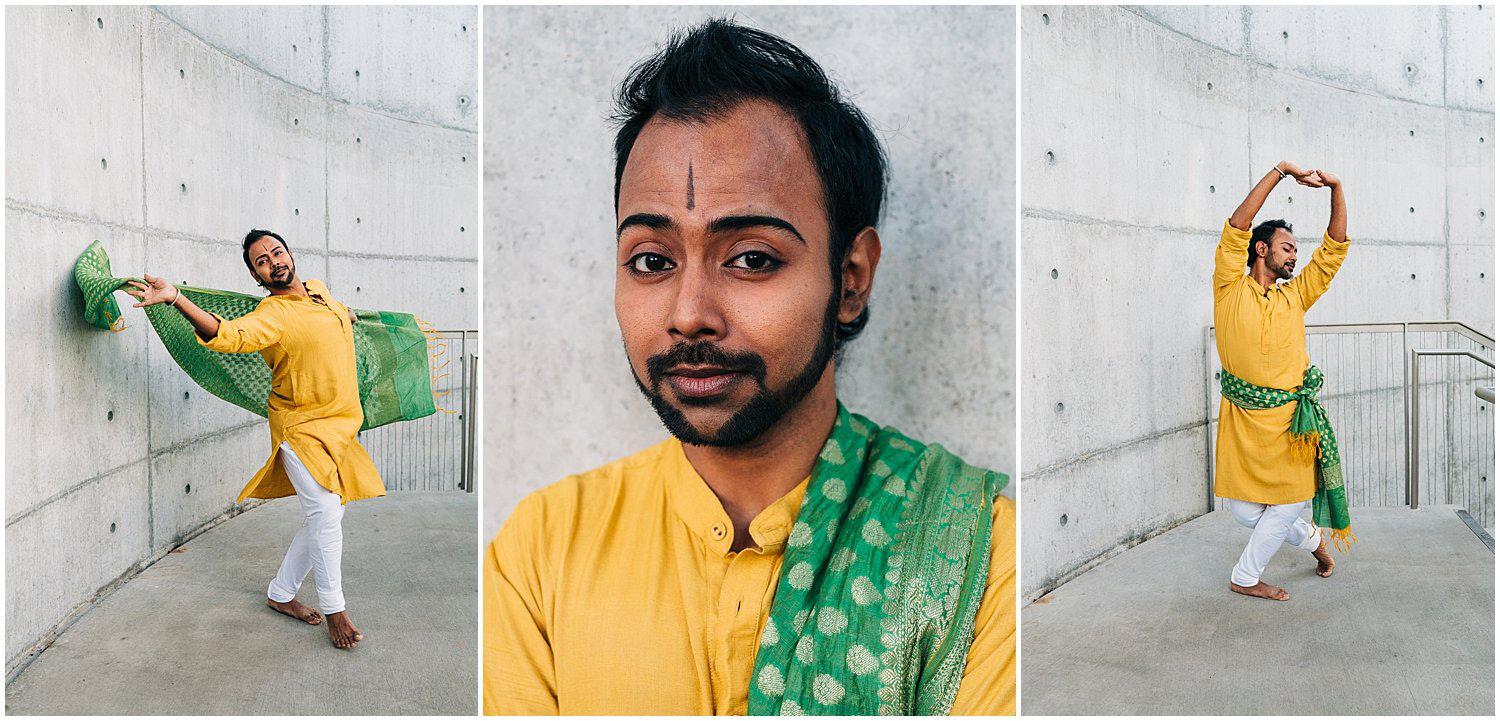
undergraduate students.
Joanna Das, who was Ghosh’s advisor as well as the Director of Graduate Studies of MFA Program in Dance, said that it was a pleasure to watch him teach.
“He just was such a clear communicator,” Das said. “He was funny, he understood the students, and he was just a master at art forms, but he also was just so good at teaching them to people, even if they had zero context or background.”
Das spoke of Ghosh’s commitment to teaching, saying that he not only taught his required undergraduate classes but also held informal classes for graduate students in other disciplines and led online classes for students back in India.
“He would wake up at 4 a.m. every morning, teach Zoom classes, come here and do his full day of classes, in the evening he would teach class again to the grad students, it was incredible,” Das said.
Marchant described his teaching style as one that put students at ease.
“He just had this infectious joy and sense of humor about it, even though what he’s teaching is incredibly difficult and he was a master at it; when he was in the room with someone brand new, he made them feel like they could do it,” Marchant said.
Ghosh’s colleagues, who became his close friends, said that he brought light and joy to the department.
“He was so grateful to be in America, to be in this program, to learn the things he was learning,” Bertho said. “He was living a dream, he would tell us how he loved everything that he was doing here.”
Ehling said that she really admired how Ghosh connected with the people he met.
“He valued every single person he came across for what they could teach him and what they could bring to him,” Ehling said. “He was so humble that every person with him, ever, felt valued, because he wanted to be with you and that was the most important thing.”
Bertho said that Ghosh left his mark for who he was — a wonderful person and a great performer with a strong personality.
“When [international students] get to America, I see a lot of people trying to fit in here and they change themselves, how they think, to be here,” Bertho said. “He was genuine in where he came from and how he thought about the world. He worked hard to understand America and how he could fit in here, but as himself. That’s something I’m going to take with me.”
Ghosh was scheduled to perform in a concert for graduating MFA students as a culmination of his work over the past two years at the end of the month. In preparation for the event, he made a short film depicting some of his dances centering around Rabindranath Tagore’s collection of songs, “Seasons of Life.” Das said that the Performing Arts Department plans to show Ghosh’s work on his final project at the event on March 22 and 23.
Jewish student groups gather on 150th day after Oct. 7 attacks
Around 60 Jewish students and community members gathered on Mudd Field for a Tisch commemorating the Israeli people killed and taken hostage during Hamas’ Oct. 7 attack, March 5. The event took place on the 150th day after the attacks.
A Tisch, which is Yiddish for “table,” is generally a celebratory event, according to Washington University Chabad Rabbi, Hershey Novack. The evening event took a more solemn tone, however, as students reflected on the attack as well as on the recent Student Union (SU) resolution calling for divestment from Boeing, which some students have
called antisemitic.
“A Tisch is typically a circle of singing. Usually, it’s at a happy occasion,” said Novack. “This is a more somber Tisch, but certainly it is tasteful and appropriate.”
Sophomore Kobe DeenerAgus, who helped organize the Tisch, said that the event offered students a chance to come together to pray for the release of Israeli hostages taken on Oct. 7.
“We’re praying for the hostages to come home safe, and a Tisch is a very relaxing, social way of prayer,” he said.
Deener-Agus said that he found one prayer, called “Acheinu,” to be particularly moving.
“‘Acheinu’ talks about releasing hostages,” he said. “It was very beautiful to sit
down with.”
First-year Emily Seligson added that the Tisch offered the students pause and gave them time to reflect on the experiences of the hostages.
“Singing gives strength,” Seligson said. “It lets us, in a somber way, respect [the hostages] and take a moment to think about what’s going on.”
The event was staged just a few days after the Jewish Student Association (JSA) posted a petition against a draft of an upcoming Student Union (SU) resolution calling for divestment from Boeing, which produces bombs that the Israeli military uses.
The JSA said in an Instagram post that the resolution was anti-Israel and in line with the goals of the Boycott, Divestment, and Sanctions
(BDS) movement. The BDS movement calls for non-violent action through boycotts against, divestment from, and economic sanctions on Israel.
In a written statement to Student Life, Speaker of SU Senate sophomore Sonal Churiwal denied that the resolution promotes BDS.
“The resolution is not a BDS resolution, as communication from other entities conveyed. It is a resolution calling on WashU to divest from Boeing,” Churiwal wrote. An earlier draft of the resolution, according to a screenshot obtained by Student Life, mentioned the student government of the University of California–Davis’ decision to adhere to “the principles of the [BDS]
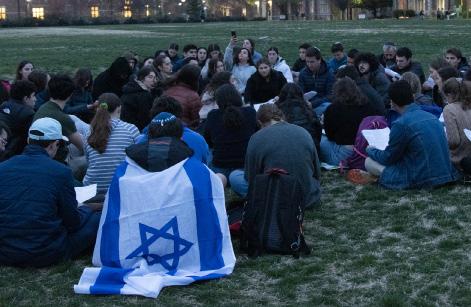
Students gather on Mudd field to mark the 150th day after the Oct 7 attacks, March 5.
movement” but did not say whether SU would do the same upon the resolution’s passage.
Though frustrated by the resolution, attendees like junior Lydia Cohen of St. Louis University appreciated
that there was a Tisch.
“I think it’s a really nice and peaceful way to come together as a Jewish community,” Cohen said. “And I think that’s what we strive for as a Jewish community, peace.”
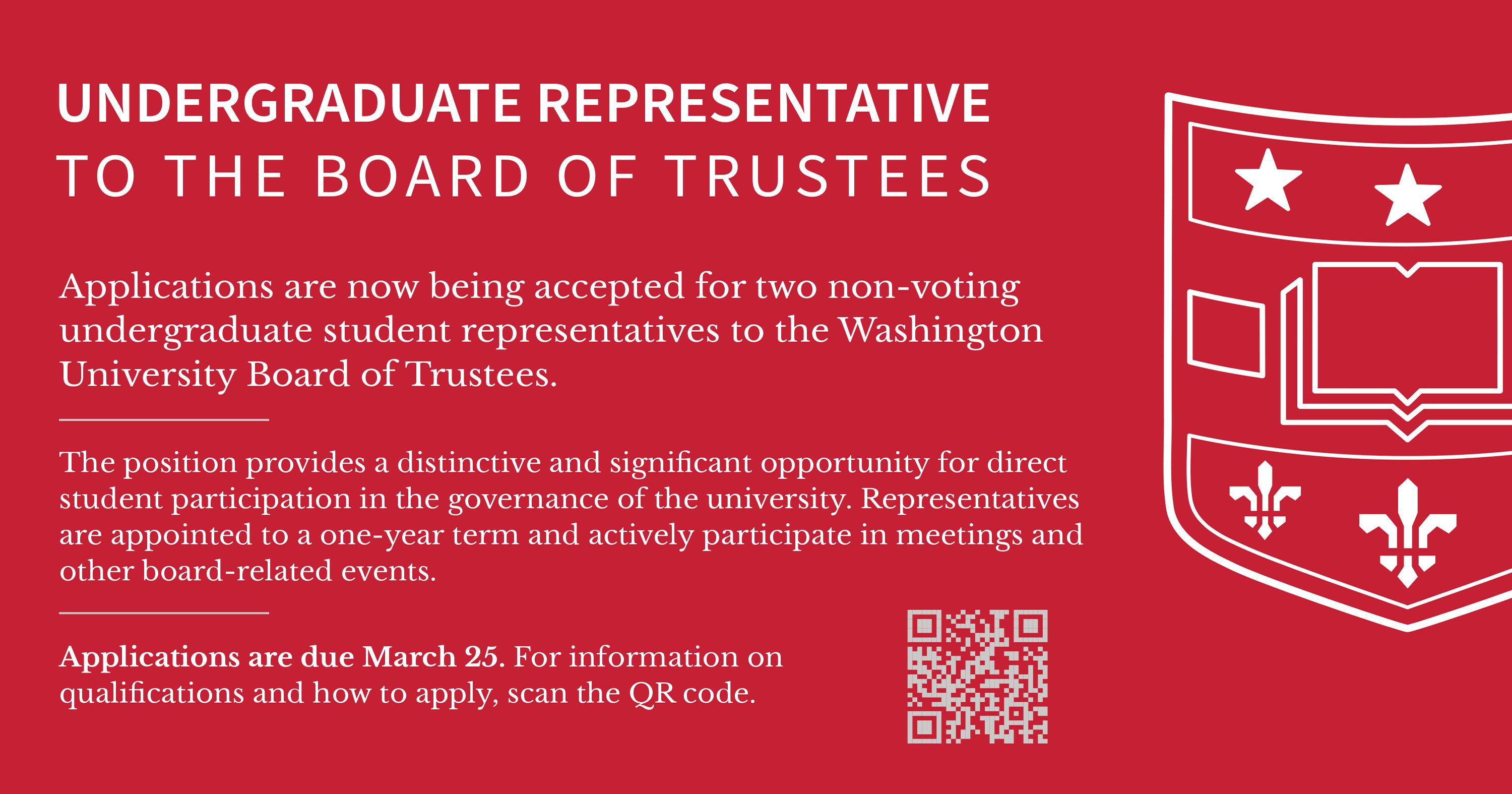
AVI HOLZMAN | MANAGING NEWS EDITOR | NEWS@STUDLIFE.COM 2 STUDENT LIFE THURSDAY, MAR 7, 2024
NEWS
JOEL SWIRNOFF JUNIOR NEWS EDITOR
BRI NITSBERG | STUDENT LIFE
COURTESY OF SAM FINK OF LUMOSCO
PHOTO
METEOR receives NIH grant for historically underfunded cancer research
The Washington University School of Medicine received a $7.8 million grant from the National Institutes of Health (NIH) on Aug. 23, 2023 to fund a new program called the MicroEnvironment and Tumor Effects of Radiotherapy Center (METEOR) spearheaded by Julie Schwarz, MD, PhD, and Clifford Robinson, MD.
METEOR’s primary purpose is to study the effectiveness of different doses of radiation and treatment modalities, with a focus on treating cervical and pancreatic cancer. Over the next five years, researchers will use the grant to analyze biological samples and use advanced imaging techniques to track images of tumors over time.
METEOR’s goal is to enhance the understanding of how the immune system interacts with tumors and how radiation interacts with the tumor microenvironment. In addition to clinical trials and an administrative and technical core, it includes a training program called METEORITE for radiation oncology residents and medical physics or cancer biology Ph.D. students.
METEOR is not a physical center, but rather an organization of WashU-affiliated staff and researchers leveraging already existing programs and working together towards the collective goal of improving radiation treatments for cancer patients.
The center is a part of NIH’s Radiation Oncology Biology Integration Network (ROBIN), made up of five total centers. Other ROBIN centers are affiliated with the University of Maryland, Cornell University, and the Cleveland Clinic Foundation, among other institutions. Each center has a different focus related to radiation oncology.
“[The National Cancer Institute (NCI)] wanted to have specific centers of excellence designed around this specific thing which we love doing, which is analyzing longitudinally collected samples from patients receiving standards of care — chemotherapy and radiation,” Schwarz said.
Robinson said that, ideally, METEOR will maintain interconnectivity with these other centers.
We are collaborating with the other ROBIN centers on these enduring materials. Part of it is cross training across centers, so we get cross pollination which happens much faster with trainees than it
CHANCELLOR from page 1
SL: Speaking of the endowment, we received communication this year that the endowment had a second year of negative returns. So how does the negative return impact University spending?
AM: The endowment payout isn’t based on just one year of performance. It’s smoothed over a fiveyear time period.
For the last two years, the amount of the endowment payout has gone flat. What the implication of that is, is for example, with regard to financial aid, the amount of financial aid is not growing at the same rate that our tuition cost is growing. And so all else equal, that means there’s
less money available for financial aid. Endowment going down — bad. Endowment going up — good.
SL: Talking about tuition increase, we received notice on February 1 that [tuition] increased by 4.5%, which has been the largest increase in the past decade. What spurred this change and how are increases calculated?
AM: When we look at our tuition number, there’s lots of things that we’re looking at, including the cost of education. Of course, almost our entire cost of education has to do with our personnel. In order to be able to keep and retain the best talent both on our
does with people like me,” Robinson said.
Because WashU already has a history and reputation of delivering high quality care to cancer patients and a genome center that provides access to bioinformatic technology, Schwarz and Robinson said they were inspired to dive deeper and try something new.
Both Schwarz and Robinson are WashU professors and radiation oncologists who are involved in organizations on the medical campus. Within METEOR, Schwarz leads the research side and Robinson leads the clinical trials side.
Schwarz and Robinston both started their positions as WashU faculty members around 15 years ago, and they said they have been good friends and collaborators on many research projects since then.
More than twenty other faculty members at WashU worked on the grant application. Robinson and Schwarz said the center itself will also involve many more research staff and trainees at professional, graduate, and undergraduate levels.
“We are just the figureheads of this grant,” Robinson said. “The brilliance of it is all the other people below — there are some really, really smart people who are doing
faculty and staff, we’ve had to be very aggressive in terms of compensation, that’s our largest expense by far. We also look at where we are in the market, and we look not just at the tuition number, but also the student fees and the housing and dining as well.
SL: Why has it increased more this year as compared to the past decade, is there a specific reasoning behind that?
AM: Inflation. SL: I did notice that inflation in 2022 was around 8% and dropped drastically this year.
AM: So, yes, and when inflation was 8%, we didn’t increase tuition 8%.

VOLUME 145, NO. 20

LYDIA
A new program in the WUSM, MicroEnvironment and Tumor Effects of Radiotherapy Center (METEOR), recieved 7.8 million dollars in NIH funding.
really great things who have agreed to allocate some of their time to this particular multidisciplinary exercise.”
Geoffery Hugo, professor of medicine and medical physics and leads the Cross Training Core Lead with METEOR. Apart from improving treatment for cancer patients, Hugo said that he hopes the center will serve as a model for other institutions to make the structure and goals of the project more widespread by implementing similar research techniques and training programs.
“These are the kinds of programs that people look to
SL: The University announced the implementation of a no loan program to exclude federal loans starting next year for undergraduates. Can you expand [on] how the university is funding this initiative?
AM: We’re funding this initiative in three different ways. One is from endowment dedicated to financial aid. I spend a significant amount of my time out
outside of WashU and say, hey, this is the right way to do it,” Hugo said. “I think that by setting up our own trainees going through these programs, they are going to be the first generation of people that really have good working knowledge of how to interact and do these new kinds of research.”
Hugo expressed his hope that the broader St. Louis community will be excited about METEOR’s work and get involved, including younger populations like undergraduates and even high school students. For example, METEORITE trainee
raising money, including for scholarship. Second is through expendable gifts. We have individuals who are going to give us money and rather than say, ‘let’s put this in an endowment to fund a scholarship for forever,’ [they say] ‘let me give you the money and you spend it next year for scholarship.’ And the third is through operations.
SL: There’s consistently been a rumor on campus
Stephanie Markovina recently gave a lecture to a biology program on the undergraduate campus that was received positively.
Robinson said that METEORITE aims to connect more to the other ROBIN centers to help trainees and the multidisciplinary aspect of this project grow.
Read the rest online:
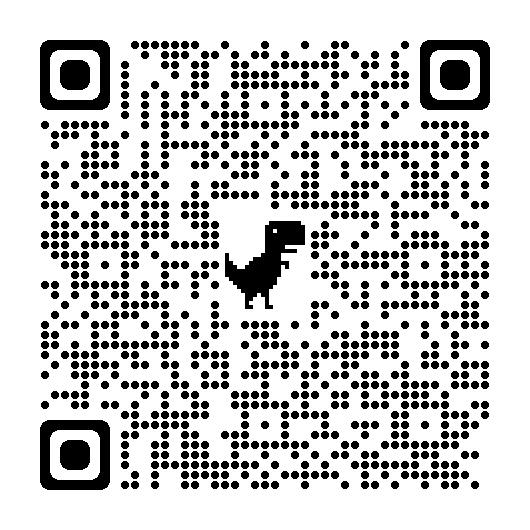
that WashU has plans to buy Fontbonne. To date, are there any plans or talk of plans of doing that?
AM: No.
Read the rest online:


Lydia Nicholson
Alan Zhou Junior Photo Editor
Amelia Raden Jordan Spector Junior Forum Editors
Lewis Rand
Elaheh Khazi Junior Sports Editors
Olivia Lee
Sophia Hellman
William Labrador Junior Scene Editors
Sophie Leong Junior Illustrator Editor
Editor
Aliana Mediratta Joel Swirnoff Junior News Editors
Tim Mellman Newsletter Editor emailedition@studlife.com
Brooklyn Hollander
Samantha Elegant
Tim Mellman Copy Editors
Kate Westfall Astrid Burns Designers
Sanchali Pothuru Multimedia Editor
Adrienne Levin Coleman General Manager a.coleman@studlife.com
Sarah Huff Advertising Sales Manager huffs@studlife.com
AVI HOLZMAN | MANAGING NEWS EDITOR | NEWS@STUDLIFE.COM STUDENT LIFE 3 THURSDAY, MAR 7, 2024
NINA LASER SAUL WEISS STAFF WRITER CONTRIBUTING WRITER
LIFE Copyright © 2024 Washington University Student Media, Inc. (WUSMI). Student Life is a financially and editorially independent, student-run newspaper serving the Washington University community. Our newspaper is a publication of WUSMI and does not necessarily represent the views of the Washington University administration. Via Poolos Clara Richards Editors-in-Chief editor@studlife.com Avi Holzman Managing News Editor news@studlife.com Annabel Shen Managing Scene Editor scene@studlife.com Reilly Brady Managing Forum Editor forum@studlife.com Riley Herron Managing Sports Editor sports@studlife.com Ved Patel Managing Chief of Copy Sydney Tran Head of Design Tuesday Hadden Ryan Davis Heads of Illustration James Ellinghaus Lily Taylor Senior News Editors Elle Su Bri Nitsberg Senior Photo Editors photo@studlife.com Tony Tong Senior Web Editor Mia Burkholder Cathay Poulsen Chiefs of Copy Ian Heft Senior Sports Editor Zara Shariff William Rosenblum Senior Scene Editors Sylvie Richards Jasmine Stone Senior Forum Editors Julia Robbins Zach Trabitz Investigative News Editors Camden Maggard Social Media
NICHOLSON | STUDENT
Chancellor Andrew Martin sat down with Student Life to discuss current issues surrounding Washington University on March 5.
BRI NITSBERG | STUDENT LIFE
Over an hour before the event, a line of students had already begun to crowd in front of Graham Memorial Chapel for the 6 p.m. guest speaker talk by Dr. Mike on March 1.
Dr. Mike, whose full name is Mikhail Varshavski, is a Russian American doctor who became popular through his social media presence, particularly Instagram and YouTube. To date, Dr. Mike has amassed over 11.8 million subscribers on YouTube with over 3 billion total views. Some of his most popular videos feature his reactions to famous medical shows such as “Grey’s Anatomy” or trying out ridiculous “health hacks.”
Waiting in line, junior
SCENE
Medicine, media, and Dr. Mike
Jeffrey Chan said, “I’ve been watching Dr. Mike since 2018. It was so interesting to see how a physician plays a role in pop culture and modern media, and I was really fascinated by how one can balance the two.”
After the audience had settled into Graham Chapel, Dr. Mike dove straight into his talk. For those who did not know, Dr. Mike’s father was a physician himself. At the age of nine, Dr. Mike saw his father and his profession “as the coolest thing ever.”
“I knew I wanted to go into medicine because it was a perfect opportunity to blend my passion with something I was good at — communication,” said Dr. Mike.
More specifically, Dr. Mike delved into the reason why he chose family
medicine as his specialty. He said that many teenagers and young adults are told what careers we should embark on.
“That is garbage,” Dr. Mike said. “If you didn’t choose to do it, every single morning you will be regretting the path you went down.”
For Dr. Mike, family medicine was an opportunity for him to change the way the field of medicine is viewed. Statistically speaking, family medicine is one of the lowest paying specialties year after year. With the average family physician’s annual income at around $255,000, there is quite a stark difference between family medicine and one of the highest paying specialties, plastic surgery, where physicians make an average
annual income of $619,000.
Dr. Mike, however, believes that “family medicine is one of the most beautiful fields. You get to grow old with your patients and ultimately decide together what is the best decision for their health.”
In the Q&A portion of the talk, Dr. Mike answered several questions from students on how to best manage work-life balance and budgeting time for yourself during medical school. Dr. Mike explained one of the lessons he learned himself: your own experiences will help shape you into a more understanding physician.
“In my first year of school, my mother died of leukemia and it was a tough time. However, I became a better person from an empathetic point of view through this
experience,” Dr. Mike said.
In addition, incorporating social media into his professional endeavors has been a pivotal decision for Dr. Mike. By sharing the realities of medical education and practice, he aims to demystify the field and foster a greater understanding between healthcare professionals and the general public.
“Drop your ego. When we [physicians] carry ourselves with our noses in the air, we lose the trust of our patients,” Dr. Mike said.
Senior Alana Depaz has been watching Dr. Mike since the beginning of the pandemic.
“He is so passionate about medicine and it really shows. I really enjoyed hearing about his motivations for his social media channels
and how he wants to spread honest information, especially since the world is filled with so many unfounded views,” Depaz said. While Dr. Mike explained how social media has allowed him to constantly pivot across different avenues, he also revealed how at times “it is actually quite lonely and hard to find individuals to relate to.”
Thus, looking at the audience towards the end of his panel, Dr. Mike emphasized that it is important to “be human. The newer generation of physicians want to do their best and sometimes it is overwhelming. It is okay to struggle — it is not a weakness.”
As for the future, Dr. Mike certainly left the audience on a cliffhanger: “I want a Netflix show.”
Bringing back Baroque: a night with Tafelmusik
With a mid-sized ensemble consisting of a harpsichord, three wind instruments, and 13 string instruments, Tafelmusik made an appearance at 560 Music Center, March 3.
Tafelmusik’s performance was part of the Washington University music department’s annual Great Artist Series — a program that aims to bring some of the most “exciting artists of our time” to the WashU
and broader St. Louis Community. The Great Artist Series features five artists every spring, with this being the third listing for the 2024 run.
Coming from Toronto, the Tafelmusik Baroque Orchestra specializes in performing Baroque-era music productions and its performance on Sunday was no different. The orchestra only performed with instruments common to that unique period of music history: violins, violas, cellos, double bass, oboes, bassoons, and
harpsichord. The group also performed pieces from the repertoires of Bach, Telemann, Vivaldi, Fasch.
Tafelmusik’s precision led to a cohesive and thoroughly constructed sound that unified the group and the performance.
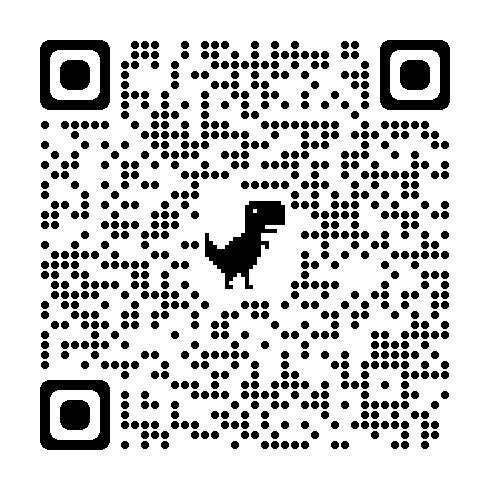

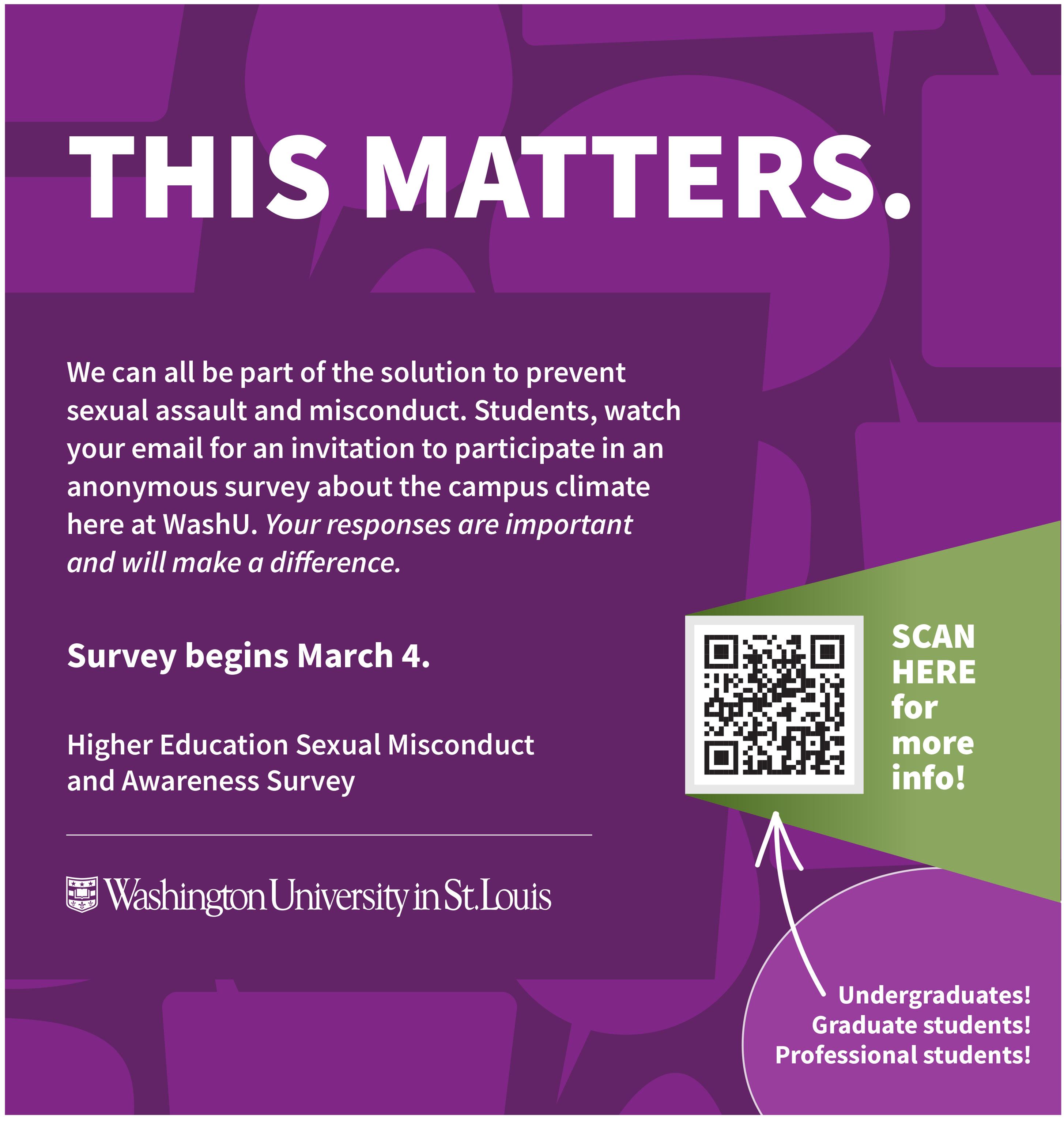
ANNABEL SHEN | MANAGING SCENE EDITOR | SCENE@STUDLIFE.COM 4 STUDENT LIFE THURSDAY, MAR 7, 2024
ANNABEL SHEN
MANAGING SCENE EDITOR
CERDA GALEASSI CONTRIBUTING WRITER
GABE
JAMIE NICHOLSON | STUDENT LIFE
the rest online:
Tafelmusik performs on the stage at the 560 Music center as part of the Great Artist Series.
Read
St. Louis Changemaker
Spotlight: John Worth & The International Institute
Student Life is launching a monthly series that aims to showcase diverse local leaders making a significant impact on the St. Louis community. The purpose is to bring attention to their efforts in fostering positive change and to introduce the WashU community to various civic causes they could get involved in.
John Worth considers himself a “be the change” kind of person. A native St. Louisan, his resume is distinctive for its breadth, but also because it displays his unique commitment to helping people. Since 2019, he has served as the Volunteer Program Manager for the International Institute of St. Louis, where he works to better the lives of refugees in the St. Louis region.
In 2023, Worth was brought onto the team at Washington University’s Gephardt Institute as a St. Louis Fellows Facilitator where he has worked with students to help mentor and shape them as future leaders. These roles, among his many others, exemplify his motto — Worth does not just wait for others to make change.
He does it himself.
Worth graduated from Southern Illinois University Edwardsville in 2018 with a degree in Criminal Justice. He knew that he wanted to pursue a career that he enjoyed, but he also sought to find one that would benefit others. Law enforcement seemed like the obvious fit because, in
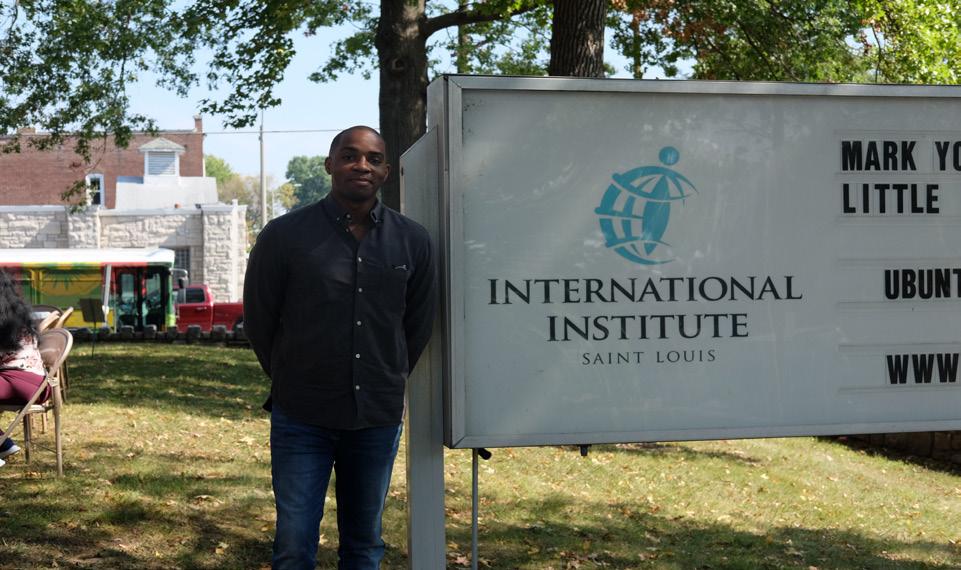
New
his words, “You’re helping people firsthand. You’re interacting with your community; you’re building relationships.” He dreamed of becoming a federal lawenforcement agent, and in 2019, he received the perfect job offer from the Drug Enforcement Agency.
This offer, however, was conditional upon a passing score on their evaluation rubric. The medical portion of the exam includes a vision test — which, because of problems with color vision, Worth did not pass. This setback nearly broke him. After working towards this opportunity for years, he struggled to face the fact that something out of his control is “going to be the thing that eliminates [him] from doing what [he] thought [he] was supposed to do on this Earth.” But Worth didn’t allow himself to feel selfpity. Instead, he found a new avenue for making change.
Worth had never considered himself someone interested in the world of politics, but after a formative conversation with his childhood best friend who worked on the Biden campaign, he decided to explore
PUZZLE PUZZLE Mania
John
the world of political activism. He started working as a field organizer in Georgia, where he got his first taste of how politics can make a large difference in a community.
Campaigning gave Worth the opportunity to form connections with community members and to “let people know that they have a voice and that it’s up to them to decide who they want to represent them.” And yet, the lack of job stability and long-term security in campaigning, which is primarily contract-based, exhausted him. He began to wonder what to do next. By the summer of 2021, Worth was wrapping up his work on the governor’s race in Virginia Beach. In August, the U.S. Department of Defense began a large-scale evacuation of U.S. and Afghan citizens from Afghanistan, following the fall of Kabul.
Read the rest online:
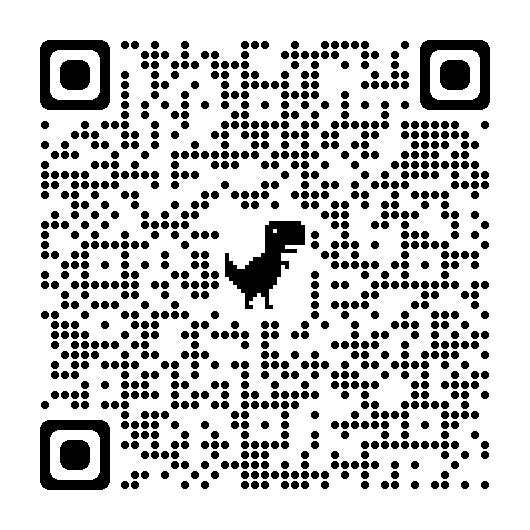
Students shine in PAD’s “The Winter’s Tale”
SOPHIA HELLMAN JUNIOR SCENE EDITOR
Melding tragedy, comedy, and romance into one, “The Winter’s Tale” is the story of a king mad with envy that escalates until the queen’s statue comes to life. The students take center stage, and it is their interpretation of the characters and their mastery of emotions that ultimately reveals the weight and nuance of forgiveness.
On the weekends of Feb.
23 and March 1, the Washington University Performing Arts Department (PAD) put on a production of Shakespeare’s “The Winter’s Tale,” directed by William Whitaker, professor of practice in drama. I went Sunday afternoon on March 3, excited to try something new, but without knowing what to expect — I can’t remember the last time I saw a Shakespeare play in person. The show was in Edison Theater, free for all WashU students.
From the start, the audience was roped into the story by the ravings of King Leontes of Sicilia, played by sophomore Tristan Dumas. Leontes believes his Queen Hermione, played by junior Ella Sherlock, has had an affair with Polixenes, a childhood friend and king of Bohemia, played by senior John Noonan. With intense dialogue and emotions running high, I could already tell there would be no lack of drama. What I did not see coming was how many different forms this excitement took.
As the play continued, the narrative changed dramatically. Suddenly, the story transitioned from a queen
dying of heartbreak to sheepshearing jigs — I had to smile at how the cast could roll with the punches and lean into the chaos.
Overall, the plot twists added to the engagement, and any confusion was made up for with hilariously timed line delivery. Even later, when heavy dialogue was required to reveal character motivations, powerful execution by the actors prevented any chance of monotony.
Junior Hope McKinney recounted her experience of playing Hermione’s loyal and strong-willed lady-in-waiting, Paulina. Specifically, she recounted a memorable scene where she was asked to deliver a piercing scream.
“It felt so good, not just for me, but for the energy I needed to bring into the scene, and when I’d gone backstage to several shocked questions of ‘Was that you?’ it instantly became my favorite part of the show.”
McKinney elaborated on how she wanted the performances to reach the audience. “Honestly, I’m not a big believer in ‘intended experience’ for any medium of art. I think, really, if ‘Winter’s Tale’ as a production is doing its job, then all it has to do is move you,” McKinney said. With all the hallmarks of a good 17th century tale, there was a well-intentioned advisor, a few loyal noblemen, and a forbidden romance. As freshman Zachary Nowacek, who played the rogue Autolycus, put it, there were also a few “unserious elements.” Remarkably, a rave illuminated by strobe lights at the sheep-shearing and a parody of the Black Eyed Peas’ “My Humps’’ sung by Nowacek’s
character both added a modern twist, lightening the mood and starkly contrasting the darker themes of the play.
“[It’s] an important piece of interpretive work [when] you can use the story and tell it a little bit differently for an audience who understands the aspects of the story that are outdated,” Nowaceck said. Song parodies and audience engagement were fitting additions to a play that already “defies categorization,” according to the PAD’s description of the show. Even after shortening the original text by 30%, the production was just around three hours, but these efforts to keep the audience engaged made up for it. At one point, the audience itself was informed to rise for the king, and naturally, members did as told!
Depicting nobility in the somber time of a king’s madness, the stage was first littered with greyscale and gold-lined outfits. Notably, a puppeteered, life-sized bear costume with glowing red eyes meshed the terrifying and the playful, hilariously chasing Lord Antigonus to later tear him apart. In the later acts, an entirely new story full of romance was seamlessly complemented by the colorful, flowery outfits that forbidden lovers Perdita and Florizel matched in, played by seniors Ava Morgan and Peter Michalski.
Read the rest online:
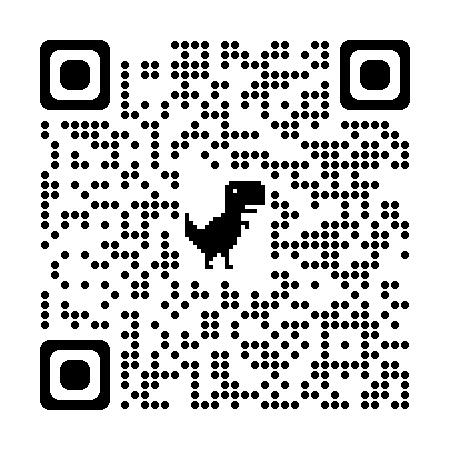


ANNABEL SHEN | MANAGING SCENE EDITOR | SCENE@STUDLIFE.COM STUDENT LIFE 5 THURSDAY, MAR 7, 2024
FRANCESCA FRKONJA CONTRIBUTING WRITER
OF JOHN WORTH
COURTESY
Gephardt Fellows Facilitator
Worth shares his story of advocacy and organizing.
Analogies Crossword by Alex Nickel 1 B 2 A 3 T 4 H 5 E 6 R U R A L 7 A D A R K 8 W I N E S 9 L O S S ACROSS 1 Wash you? 6 Cities : urban :: countrysides : 7 "It was _ ____ and stormy night..." 8 Bibliophile : books :: oenophile : _____ 9 Defeat DOWN 1 Duke it out 2 Sound 3 4 Pride : lions :: husk : _____ 5 Antlered animals Last week’s solution Alt, Indie, Etc. Crossword by Alex Nickel 1 2 3 4 5 6 7 8 9 ACROSS 1 What your Spotify Wrapped shows 6 Lana Del Rey song "_____ to Watch Boys To" 7 The 1975 lyric "I'm not playing with you, baby, I think that you should give __ _ __" 8 Christopher Nolan film with a palindrome title 9 Mitski song 'Washing Machine _____" DOWN 1 "Either/Or" creator Elliott 2 Alexander the Great, to Aristotle 3 Yoga posture 4 Fleet Foxes song "_____ Mountain Peasant Song" 5 Phoebe Bridgers song "_____ Street"
FORUM
A label beyond sound: the appeal behind indie
groups unaffiliated with large record labels could attain immense success, causing the number of independent labels to boom.
When I ask what genre of music a friend listens to, the response is often “indie” — followed by a slew of artists’ names. However, the listed musicians may be completely unrelated in sound, style, or feel. As artists and listeners continue to label their music as indie, the term becomes nothing more than a vacuous buzzword. Is there a better option?
Although we consider indie a modern genre, it has been around in some shape or form since the 1950s. This original definition of indie refers to independent music groups or record labels — basically, the lack of association with major corporate record labels. However, the term became more widely used after its attribution to the DIY rock scene of the 1980s. Bands like The Smiths and later, R.E.M., proved that music
JACOB FISHER STAFF WRITER
How much is $4.8 trillion? It’s an unfathomable number and one I have yet to see well described at a magnitude less. It exceeds our senses. It exceeds scope. And yet, it is the dollar amount our federal government collected in taxes in the 2023 fiscal year. Call it a forced donation — or to some commentators, an unconstitutional ransom.
Yet the headline of 12 zeros should be the least of note about the IRS’ income. Instead, it should be about the impact every dollar has, because all too often, we ignore the science of our small but meaningful
TIM MELLMAN NEWSLETTER EDITOR
I
at 6:30 a.m. indefinitely, the
on Oct. 7, 150 days ago today.
are Hebrew letters,
As the sound of these bands grew mainstream, a new name for the sound was added: alternative rock. The term indie stuck around as well, causing some to use the two interchangeably.
Now, as the music industry moves into the streaming era, releasing music has become easier than ever, and as a result, indie music, as it was originally defined, is at an all-time high. Independent artists upload tens of thousands of songs to Spotify each day, not to mention to other music streaming services like SoundCloud.
In response, Spotify works fervently to sort music into distinct genres, often making up new ones when necessary. In 2016, Spotify classified its music into 1,482 genres. Today, the music app boasts over
6,000. Many of these newly fabricated genres appear obscure and strange to listeners and artists alike, resembling nothing more than randomly generated gamer tags. After all, what is vaporwave, fallen angel, or deep psychobilly?
Then again, Spotify does not have much of a choice. As music streaming services break down geographic and temporal limitations, and as critics celebrate the creation of “new sounds,” genre-blurring is at a record high.
In the meantime, music streaming services must find a way to categorize and offer recommendations to their listeners. Humans need genre to understand music, or at least to sell it.
Nevertheless, Spotify’s homemade genres have yet to catch on to most listeners’ vocab. Instead, terms like indie and alt take the cake. But why have we been so eager to label music as indie for the last three
decades, and why can’t we let go? Why do we label disparate artists such as Noah Kahan, Radiohead, and Mac DeMarco as the same “genre”?
The answer lies in the origin of the term. Independent labels have consistently resembled an anti-institutional sentiment — their opponent being the major record labels that have dominated the music industry since its beginning.
As we consume art, we want to feel that it is genuine, to feel like it was made as art — not as a product to be marketed and sold. This has been the message of true indie music since its beginning. This is the message that listeners want to tell themselves, and it is why people are so eager to label their taste as indie — even if the music does not obviously match the sound or the imperative that indie was originally intended to represent. Indie is not the first

ILLUSTRATION BY JAIME HEBEL
genre to claim separation from the corporate world. From jazz to rock to hiphop, music genres like indie have risen alongside countercultural movements. Now, more than ever, listeners need to feel that the art they consume is not another product of the corporate world. Although indie can not
Want to fight poverty? Start loving taxes
contributions. What we pay every April is a celebration of democracy, our small part in oiling the money-hungry but much-needed machine of keeping our communities alive. What’s not to celebrate?
For most Americans, tax season is less of a celebration and more of a punishment, one that revels in inequity instead of fighting against it. Who wants to be forced to give up their hard-earned dollars just so they can subsidize the wealthy shareholders of the Intel Corporation or ever-villainous Amazon? It seems plainly unfair, as if it is a system designed to punish low-income families from succeeding against the everdaunting chasm between
themselves and the wealthy. For a tax system that promises to be progressive, it is ironic that much of our money goes towards shoring up corporate farmers instead of fighting against them.
But that does not mean taxes do not really help those who need them; to be frank, they help all of us.
Sixty-five percent of federal spending goes towards many universal and critical welfare programs such as Social Security, Medicare, and Medicaid, those being lifesaving programs that secure the health and futures of tens of millions of Americans. In other words, these programs are a lifeline to the nation’s most vulnerable, and by a guarantee of the taxes on our paychecks, eventually
to our future selves. Where we spend the other 35% is up for healthy debate, but for the sake of achieving a more equal nation, our money is often well-intended.
However, some commentators may question the efficacy of the tax state, but for every supposedly “more economically efficient” donation by the likes of Bill Gates towards world hunger also comes the arguably less admirable billion-dollar donation to a medical university. Tell me, is that money most effectively spent on the future elite instead of the truly destitute? What differentiates the tax state from your runof-the-mill Bill Gates or MacKenzie Scott is not money, resources, or the
pedestal of “effective altruism,” but the sheer amount of data the modern hegemony collects. It does not take a conspiracist (but perhaps a Snowden leak) to realize that the modern state, extending from their budgets to their militaries, and increasingly their police, is made from invaluable troves of data that can tell nearly limitless stories, including statistics about who truly needs our tax dollars. Within minutes, I can access bounties of upto-date statistics ranging from the mundane inflation records to the granular economic situation of Louisville, Ky. I cannot imagine what the IRS can access. To a policymaker, these statistics are the lifeblood of decision-making. Then what
A wristwatch stuck in time
counting up numerically from aleph for one, bet for two, and so on.
On the right side, there’s a date dial, and just below that are three Hebrew words: “Yevarechecha Hashem Veyishmerecha,” the first line of the Priestly Blessing, a prayer for the well-being of the Jewish community. In English, it means “May G-d watch over you and guard you.”
When I bought my watch during my Birthright trip to Israel last May, it was a symbol of my connection to my family, my people, and my people’s history. When it was set
to Israel time, a glance at my right wrist immediately connected me with my five cousins and aunt and uncle in Beit Shemesh, 45 minutes west of Jerusalem.
Initially, I didn’t feel as connected to the Priestly Blessing. I didn’t feel like I necessarily needed to be guarded.
That changed 150 days ago, on Oct. 7.
Over 1,100 innocent Jews and other residents of Israel were murdered in cold blood. Hamas terrorists intentionally targeted civilian infrastructure such as schools and youth centers in small
Caption this! Enter this week’s contest
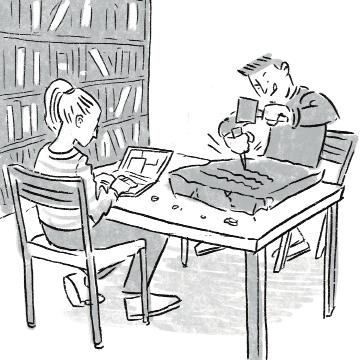
Scan

communal villages known as kibbutzim, populated by civilians. Kibbutz Re’im, for instance, hosted a music festival promoting peace before it was attacked and over 360 attendees were murdered. Re’im itself has not a single active-duty soldier, according to survivor Gal Cohel-Solal, who recently spoke at Washington University. Over 250 more were kidnapped by Hamas. Over half of them remain captive 150 days later. That includes one-year-old Kfir Bibas, who has now been held captive for over onethird of his life.
On Oct. 7, time for the Jewish people stopped.
In November, my watch stopped, too. Whether it was a battery issue or a mechanical issue, I don’t know. But curiously, the second hand still tries to tick along. Always at the 58 second mark, ticking every second into the 59th spot before springing back.
But I still wear my watch. I’ve reset the time to 6:30 a.m. and the date dial to the seventh of the month. The second hand continuously tries to tick forward — and continuously fails.
The watch has a new
03/07 WINNERS
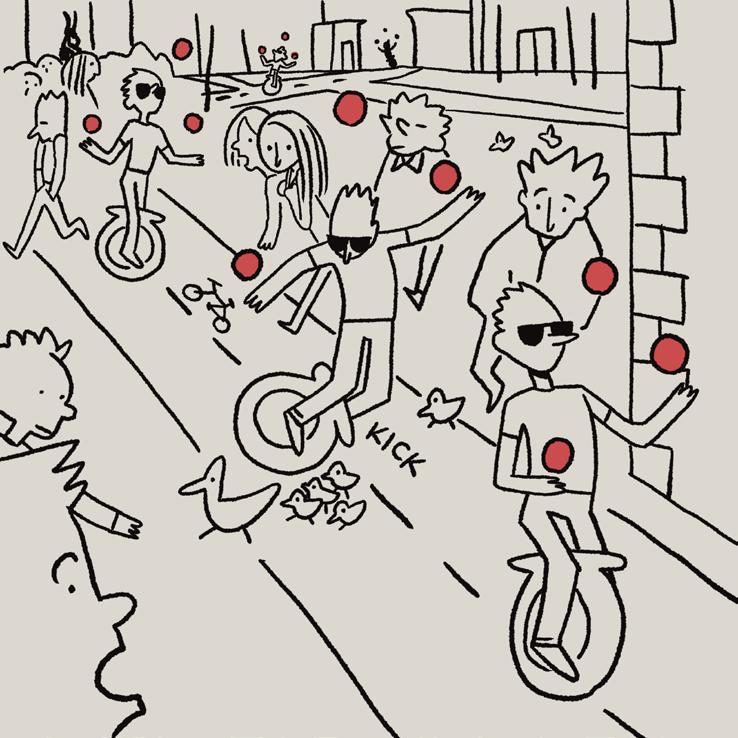
be used to describe a particular sound, it may be used to describe a band or song’s ethos. I expect that we will continue to label our music as indie for some time, but when all the significance has been wrung out of the word, be prepared for a new term to take its place.
is this data to us, the average citizens?
For me, it is the data that allowed me to go to college. Without the federal government’s knowledge of my family’s economic situation or my mother’s disability, we would not have been able to afford our house, our cars, and especially the evergrowing cost of attending Washington University. As our school becomes more socioeconomically diverse and more of my Pell-granted siblings are given the opportunity to walk through the iconic gates of Brookings Hall, you best know that my future self will be saluting the flag as I submit my tax return this April 15. The future students of WashU deserve it.
meaning now — it’s a reminder that time for my people stopped on Oct. 7, and it hasn’t restarted.
So today, 150 days after the single deadliest day for the Jewish people since the Holocaust, I ask you to take a few minutes to remember the 1,200 innocent souls we lost and the dozens who are still held captive in Gaza.
To those still captive, I think of you when I read the words on my watch: Yevarechecha Hashem Veyishmerecha. May G-d watch over you and guard you.
First place I didn’t know this is what my friends meant when they said they were juggling a lot right now.
Margaret Dresselhuys, Current WashU Student
Second place
Yes, Mom, I’m successfully juggling campus life and classes!
Denis Bader, WashU Parent
Third place
WashU admissions introduces new lunchtime parade to woo prospective students.
Margaret Dresselhuys, Current WashU Student
REILLY BRADY | MANAGING FORUM EDITOR | FORUM@STUDLIFE.COM 6 STUDENT LIFE THURSDAY, MAR 7, 2024
DAVID CIORBA
CONTRIBUTING WRITER
the QR code
enter
submission
to
your
by 11:59 p.m. on Monday.
ILLUSTRATION BY TUESDAY HADDEN ILLUSTRATION BY RYAN DAVIS
two watches.
watch on my left wrist is set to local time. The watch on my right wrist used to be set to Israel time, eight hours ahead. Now, it is set to Jewish time
stuck
exact time
Hamas invaded
homeland
wear
The
—
that
our
relatively standard watch, with a shiny metal frame and a white face. But in the place of numbers at the hour
It’s a
increments, there
SPORTS

“Sweet sixteen, baby”
Men’s basketball advances to the third round of the NCAA tournament for the ninth time in school history.
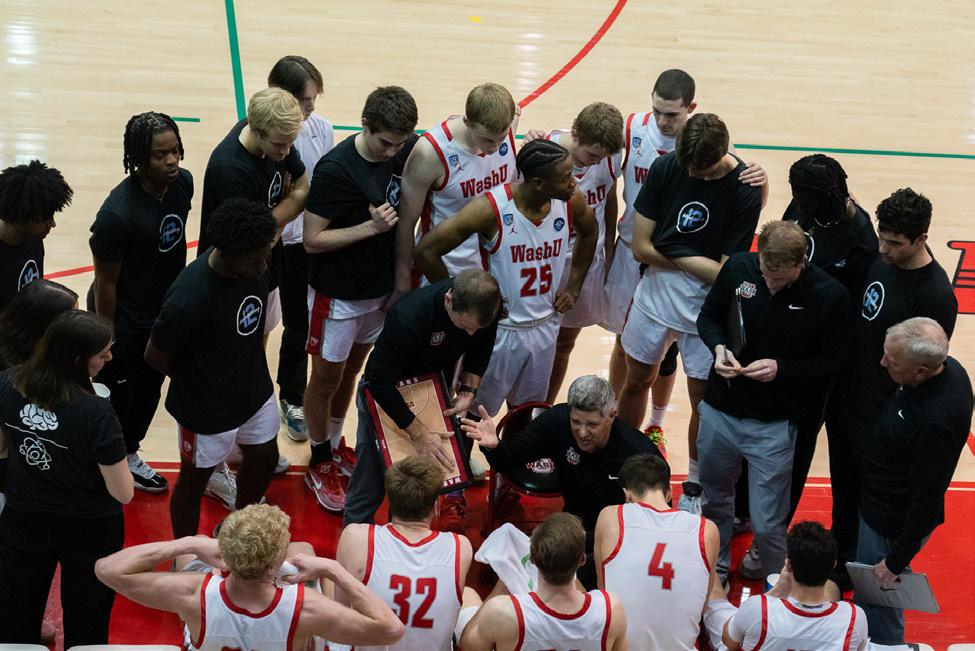
BASKETBALL
from page 1
Second round game
The Bears looked to continue their momentum into the following night versus Illinois College. Unlike the first game, the Bears found themselves down 13 points early. In an alltime classic game that saw 19 lead changes, 11 ties, and an electric atmosphere, the Bears pulled off the comeback, winning 68-67 in overtime.
“This is what it’s all about,” Juckem said after the game. “Just two teams that laid it on the line…I can’t say enough about the resiliency of our team.”
Kapral was a force down low, scoring a team-leading 18 points and 10 rebounds.
“To be honest, there’s not a lot of guys my size,” Kapral said. “I can dominate inside… it really opens it up for our guards.
The WashU big men added an unusual wrinkle to their game, as both Kapral, who had never attempted a threepointer in a college game, and Davis, shot 4-4 combined from beyond the three-point arc.
“When we said you guys have the license to shoot it… the smile on Calvin’s face was [huge]” said Juckem. “It was just awesome and they shot it
without hesitation, and no one in our group was surprised.”
Beedon again came in clutch, with a layup off a missed three-pointer to tie the game in regulation. In overtime, he would hit two threes to give WashU the crucial scoring bump it needed to pull ahead.
Oliff continued to impress on the boards, this time leading all players with 12 rebounds. His free throws that ultimately sealed the game came from another offensive rebound that saved the day for the Bears.
After Illinois College’s attempt to repeat its late-game magic with just under two seconds on the clock, the large crowd of WashU students stormed the court, celebrating a WashU basketball win like few have ever done before.
The Bears will next take on Trine University in the Sweet 16 on Mar. 8. The Bears team is looking forward to what’s to come, which Juckem succinctly described in just three words: “Sweet 16, baby.”
Ian Heft and Riley Herron contributed reporting to this article.
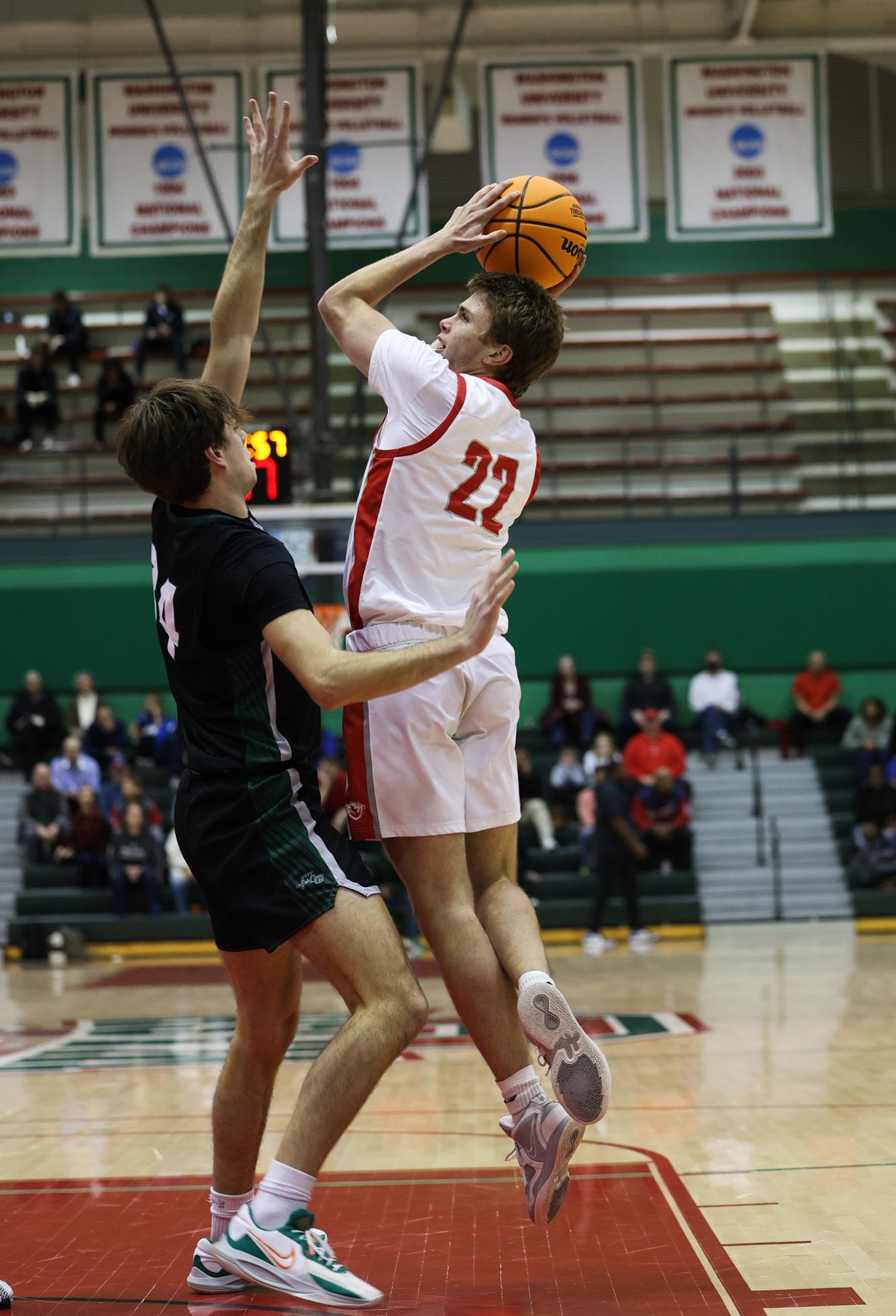
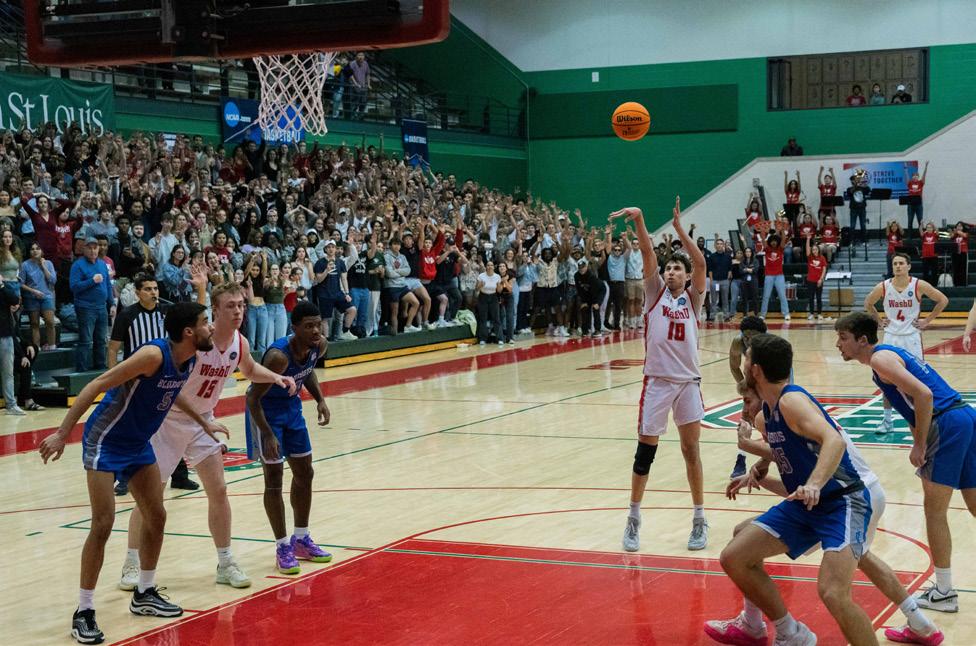

Yogi Oliff discusses staying calm under pressure and his experience as a Jewish athlete
RILEY HERRON MANAGING SPORTS EDITOR
In his sophomore season,
Yogi Oliff has started every game for the Washington University men’s basketball team. The point guard, who was named to the University Athletic Association’s allconference second team, leads the Bears in rebounds (7.3 per game), assists (3.8 per game), and steals (1.3 per game).
In the Bears’ most recent game, an NCAA tournament second-round win over Illinois College, Oliff hit two free throws with 1.8 seconds remaining in overtime to send WashU to the Sweet 16. After his game-winning shots, Oliff sat down with Student Life to discuss that high-pressure situation, his adjustment to college basketball, his experience as a Jewish college athlete, and his interests off the court.
The interview has been edited for length and clarity.
Student Life (SL): There’s only one place to start. Walk me through how you were feeling in the final seconds of the game Saturday night.
Yogi Oliff (YO): Honestly, there weren’t many thoughts going through my head. [I was] kind of trying to just be zen in those moments. You know, you don’t want to overthink, like at the end of the day, it’s a free throw. Everyone’s trying to make shots, you know, you’re not trying to miss. So you can kind of consume your mind with like ‘I have to do this, I have to make this.’ [You have to] just trust your preparation and go out there confidently, and that’s what I did.
SL: In your basketball career, have you ever been in a high-pressure situation like that?
YO: Yeah, it’s funny. My senior year of high school [there was a] huge conference game, packed crowd. We were inbounding the ball and my coach called the timeout and ran a play for me to set a charge on the guy guarding the inbounder, and we got it with one second left. I went to the line with one second, in a packed gym, and it was a
one-and-one. I missed the first one in and out. And so it was literally like the same exact situation, down one here. It’s kind of funny, I was joking with my dad after the game [that it] was like a revenge game for me, just like proving [to] myself that I could, you know, convert in that highpressure situation. So yeah, it was definitely nice to make them this time.
SL: You’re a 6’3’’ point guard, on the smaller side for a college basketball player, yet you’ve led the team in rebounds and had numerous double-digit rebound games. What’s your key to success on the boards?
YO: I think it’s kind of like a mindset. I think the easy part is going to track down the rebounds, and like the hard part is boxing out. A lot of times our bigger guys have to box out the guys who are always around the paint — the opponents’ big guys — and it’s on the guards to come into the lane and clean up the rebounds. My biggest motivation to get rebounds is just to win our team extra possessions, you know, because at the end of the day, these games all come down to one or two possessions and if you can win more possessions, then you give yourself a good chance to win.
SL: You are a sophomore but have been thrust into a big role as a starter since early on freshman year. What have been the biggest adjustments from high school to college ball?
YO: Physically is the first thing. At the college level, everyone’s stronger, [especially] coming in as an 18-year-old playing against some like 23-year-olds. That’s a huge adjustment. And then I think, just in high school, I was pretty ball-dominant — I had the ball in my hands throughout the game. When you get to college, it’s an adjustment because everyone was kind of ball-dominant in their high school.
SL: What has it been like to play under head coach Pat Juckem as part of this WashU program?
YO: It’s been awesome. I
think WashU has a huge tradition of basketball success, so there’s a responsibility to kind of uphold that and also grow that even further. But, you know, [Juckem] is an awesome person. He cares about all of his players and that’s the most important thing outside of the court. In terms of basketball, he always has us prepared for our games, like our scouts are always very detailed and indepth. Our whole coaching staff is just a coaching staff that you want to win for.
SL: Looking forward, you have a big Sweet 16 game on Friday. How are you feeling about the matchup against Trine?
YO: Good, I mean, we’re definitely confident. There are 16 teams left, everyone’s really good. We know they’re a really good team; they’ve been really good all year. You know, we’re also a good team, so we feel very confident and we’re just excited for that opportunity.
SL: Is the tournament canceling spring break plans for you guys?
YO: Yeah. We talked at the beginning of the year that we don’t make spring break plans. We always planned on still being in the tournament during spring break.
SL: Can you share a little about your experience playing for team USA in the Maccabi games?
YO: That was probably my favorite summer. It was coming into freshman year. You’re only together as a team for like three weeks in Israel, but we just got so close, traveling around the country and practicing together, playing games. It was just like a super tightknit group, which made it such a memorable experience, and just being around everyone was an awesome experience.
SL: There is often little representation of Jews in high-level athletics. What does it mean for you to be a Jew competing at an elite level of college sports?
YO: Yeah, there’s not many of us, so it’s definitely cool. That’s a big part of my identity, my upbringing, so I have a lot of Jewish pride. [I’m] just trying to represent, share it in a positive way. On the court, if I
can do that, then that’s a good thing.
SL: At games, I can’t help but notice the large Jewish community cheering you on every week. What does that support mean to you?
YO: It’s awesome, that support really means a lot to me [and] it makes a huge difference in my experience. I hope they enjoy coming to the games; I’m sure it’s a lot of fun for them too. It’s just been awesome to see that Jewish community support me and the team as a whole.
SL: Obviously, a number of your games come on Friday nights during Shabbat. Was it a tough decision for you about playing on Shabbat?
YO: I’ve played on Shabbat but I’ve actually never really traveled on Shabbat so it can be tough. There can be conflicts that arise but I always try to do my best to not compromise basketball [and] not compromise my religion. If I can kind of find that equilibrium, that middle place, then I try to do that to the best of my ability.
SL: Off the court, you’re in the Olin School of Business. Do you know what you want to do career-wise?
YO: Right now, I’m doing a lot of career exploration, trying to talk to a lot of people who are successful in different industries within business. I’m honestly still exploring a lot.
SL: What are some things you like to do off the court?
YO: I love to be outdoors, I like nice weather. As much as I can be outdoors, off screens, I love doing that. But I’m just a people person, I like hanging out with friends and family. I spend a lot of time in the gym, so outside of that, I just love building relationships and hanging out with people that I enjoy being around.
SL: Last question, we ask this to all of the Student Life Athletes of the Week. Would you rather have fish for hands or adopt a child every time you hear “Bohemian Rhapsody”?
YO: I guess fish for hands.
SL: Any reason why?
YO: Just a process of elimination.
RILEY HERRON | MANAGING SPORTS EDITOR | SPORTS@STUDLIFE.COM STUDENT LIFE 7 THURSDAY, MAR 7, 2024
PHOTO ESSAY BY ELLE SU | STUDENT LIFE
YIWEN ZHA | STUDENT LIFE
Emmett Lawton played 22 minutes in the team’s first round game.
After
a resilient season, women’s basketball falls short in NCAA tournament
MATT EISNER STAFF WRITER
After losing four of its first seven games, it seemed like the Washington University women’s basketball team was in for a reset season. As one of the youngest teams in Division III, it made sense that the relatively young Bears might need a year to adjust.
But WashU did not stop fighting. As senior guard Jessica Brooks returned from injury and the Bears’ first-years quickly adapted to head coach Randi Henderson’s playbook, the squad caught fire, riding that momentum to win 14 of its remaining 18 games to secure an at-large bid to the NCAA Division III women’s basketball tournament.
The team’s tournament run ended abruptly in the first round, however, as they fell to the University of Wisconsin-Stout Blue Devils 71-61 on Mar. 1.
“This has been an incredible journey,” Henderson said. “I’m super proud of all of my players.”
The game was tightly contested in the first half.
In the first quarter, Brooks and Stout senior guard Sydney Brennan traded threes, and solid defensive play from first-year center Lexy Harris allowed WashU to take a fivepoint lead into the second quarter. As the game progressed, however, Stout started to whittle down the Bears’ offense. Outscoring WashU 18-10 in the second quarter, the Blue Devils took the lead into the half.
The Bears were able to hold Stout to shooting just 35% from the field in the first half.
However, WashU could not respond to Stout’s physicality on defense, attempting fewer shots from the field that had driven their success this season.
“I told [my players] the game was going to be physical,” said Henderson. “Stout’s physicality didn’t surprise us, but it’s hard to prepare for that in
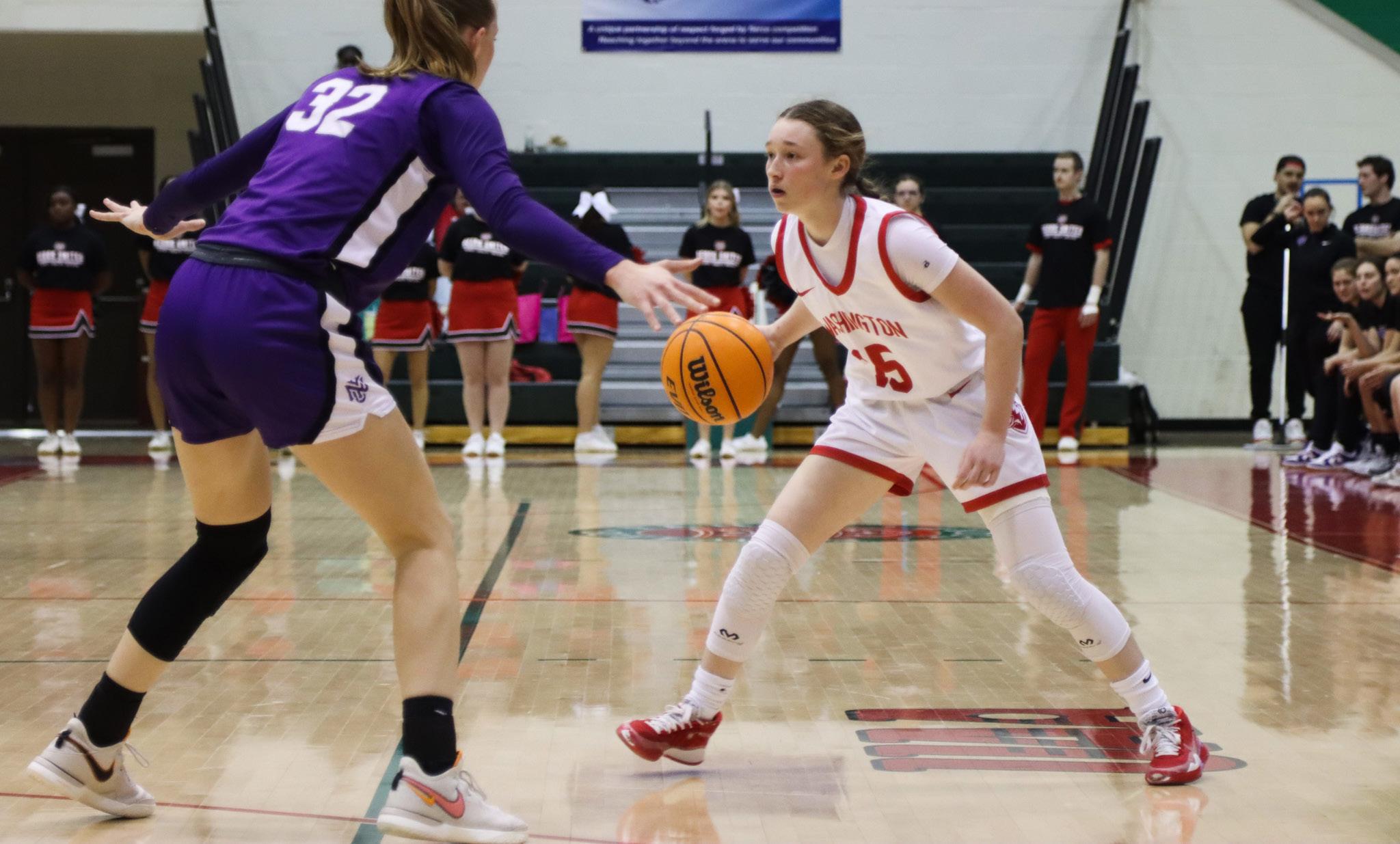
practice.”
To Harris, this was the biggest difference between playoff games in high school and college.
“The game is so much more physical in the college playoffs,” Harris added.
The Bears scored 12 points in the paint in the third quarter, nine of which came from Harris. But for every score the Bears recorded, Stout responded with a bucket themselves. Stout guards junior Raegan Sorensen and senior Anna Mutch both contributed 22 points in the contest, with senior forward Amanda Giesen adding 13.
While WashU pulled ahead at the beginning of the fourth quarter, the Blue Devils scored 21 points in the final six minutes to snatch the victory away from the Bears.
“As you move along in the tournament, the gap between teams gets smaller and smaller,” Stout head coach Hannah Iverson said in a postgame press conference. “Our ability to handle adversity and make the ‘right plays’ was huge for us.”
Harris led the Bears with 22 points, while Brooks and first-year guard Catherine Goodwin each scored 14. WashU was incredibly successful in the paint, where they scored 38 of their 61 points. From the perimeter and beyond the three-point line, WashU was far less successful. The Bears went just 3-for-16 from three.
“We didn’t make shots today,” Henderson said. “That forced us into a lot of turnovers, which hurt us down the stretch.”
The Bears finish the season with a 17-9 record, picking up major victories against ranked rivals Wartburg College and Emory University while recording a five-game winning streak in late December and a sevengame streak in late January and early February. WashU saw program highlights this season, winning its 1,000th game against Brandeis University with the Bears’ largest margin of victory in Henderson’s tenure as head coach.
Harris scored the most total points for the Bears this season, scoring 418 points and averaging 7.4 rebounds per game en route to the University Athletic Association (UAA) Rookie of the Year award. Goodwin and firstyear Sidney Rogers also impressed in their inaugural campaigns with the Bears, averaging the thirdand fourth-most points on the team, respectively.
“Our six first-years have grown tremendously since the first week of games,” Henderson said. “They have taken coaching and peer feedback and have gotten better every single day.”
The Bears’ head coach also complimented the squad’s more experienced players for welcoming the first-years into the rotation.
in conference play.
Brooks, who averaged over 15 points per game for the second consecutive year, spearheaded the Bears’ offense and was named to the UAA’s All-Association first team for the second year in a row. After what could have been her final game with the Bears, the senior was reflective on the WashU women’s basketball program after the loss
“There were a lot of times where I could have given up,” Brooks said. “But when I didn’t have that confidence or support from myself, I knew my teammates and coaches had my back.”
In Rogers and Goodwin, the Bears have young depth to fill in for Brooks next season. However, Brooks and fellow senior guards Christina Walker and Katie Minkler hold an extra year of NCAA eligibility after losing their freshman year to the COVID-19 pandemic. After the game, Brooks expressed interest in coming back for one more year with the program. If Brooks comes back for a fifth year, her experience and talent, combined with the improvement of the Bears’ younger players, could make WashU a national championship contender.
“This loss stings pretty bad. [Coming back] is definitely something I’m thinking about,” she said.
Tennis teams put on a master class against North Central and DePauw
ARYAN KUMAR STAFF WRITER
After placing second in the 2024 ITA national indoor tennis championship, the No. 2 Washington University men’s tennis team was looking to take this momentum into the outdoor part of the season. They did just that, going 2-0 to start this new part of the season.
The women’s team, ranked No. 17 in the country, similarly dominated, winning their only match of the weekend 8-1 over North Central College.
The men’s team began the weekend by dominantly defeating North Central 7-2. WashU’s doubles teams started the match strong, going 2-1 against the Cardinals. While the top duo of sophomore Colin Scruggs and senior Gaurav Singh dropped their match 5-8, the second and third duos had strong performances, defeating the Cardinals 8-6 in both matches.
The Bears continued their winning ways in the singles matches. Despite senior Jared Phillips dropping a close match in the top singles spot, the rest of the singles prevailed, giving WashU a 5-1 advantage in singles matches. Sophomore Eric Kuo was dominant as he won 6-0, 6-1 in second singles.
The next day, the Bears defeated DePauw University 9-0. Every single Bears player competing won their match, headlined by Phillips and Kuo winning 6-0, 6-0 and 6-2, 6-1 in the top two singles matches. Junior Scott Yamamoto dominated the sixth singles match, winning 6-2, 6-1.
Looking forward, the Bears will travel to California to play six matches in four days during spring break.
Kuo said the team is hopeful for the outdoor season. “We are looking to finally reach the potential that we have had for many years,” Kuo said.
During this daunting stretch of the season, the Bears are looking forward to taking on No. 6 Bowdoin College, which Kuo said “should be their toughest foe of the stretch.”
Other ranked opponents the Bears will face on their trip are

the No. 25 California Institute of Technology (Caltech) and No. 11 Sewanee: The University of the South, who WashU beat in the first round of the ITA Indoor Nationals on Feb. 23.
The Bears will kick off their spring break trip by facing off against Azusa Pacific University on March 11.
As good as the men’s team has been this year, the No. 17 women’s tennis team has been arguably just as impressive. The Bears currently sit undefeated against their Division III opponents. While the team has excelled early on, they are staying locked in on the future.
“The team has been focused on our big goals,” senior Maggie Yang said.
The team looked to stay red hot as they faced off against the 13-1 North Central, and that they did. The Bears defeated North Central in dominant fashion 8-1. North Central came out of the gates strong, winning number one doubles 8-4. But after that WashU dominated, winning the rest of their doubles and singles matches.
First-year Eleanor Archer and senior Karen Gao started the Bears’ dominant streak as they won their number two doubles match 8-6. Junior Ainsley Heidbreder and sophomore Nina Moravek continued their winning ways as they won their set 8-3.
WashU turned the notch up during singles as they routed North Central in every match. Specifically, sophomore Amber Edmonds dominated as she won both of her number four singles sets in 6-0 sweeps. While the Bears have been dominant, Yang believes that the team “still needs to improve on becoming more adaptable to any circumstance.”
Just like the men’s team, the women’s team will also spend spring break in California. The Bears will begin their four-game trip in Claremont, California against the topranked team in the country, Claremont-Mudd-Scripps Colleges. The team will also play Caltech, Bowdoin, and Chapman University.



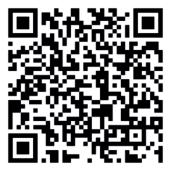
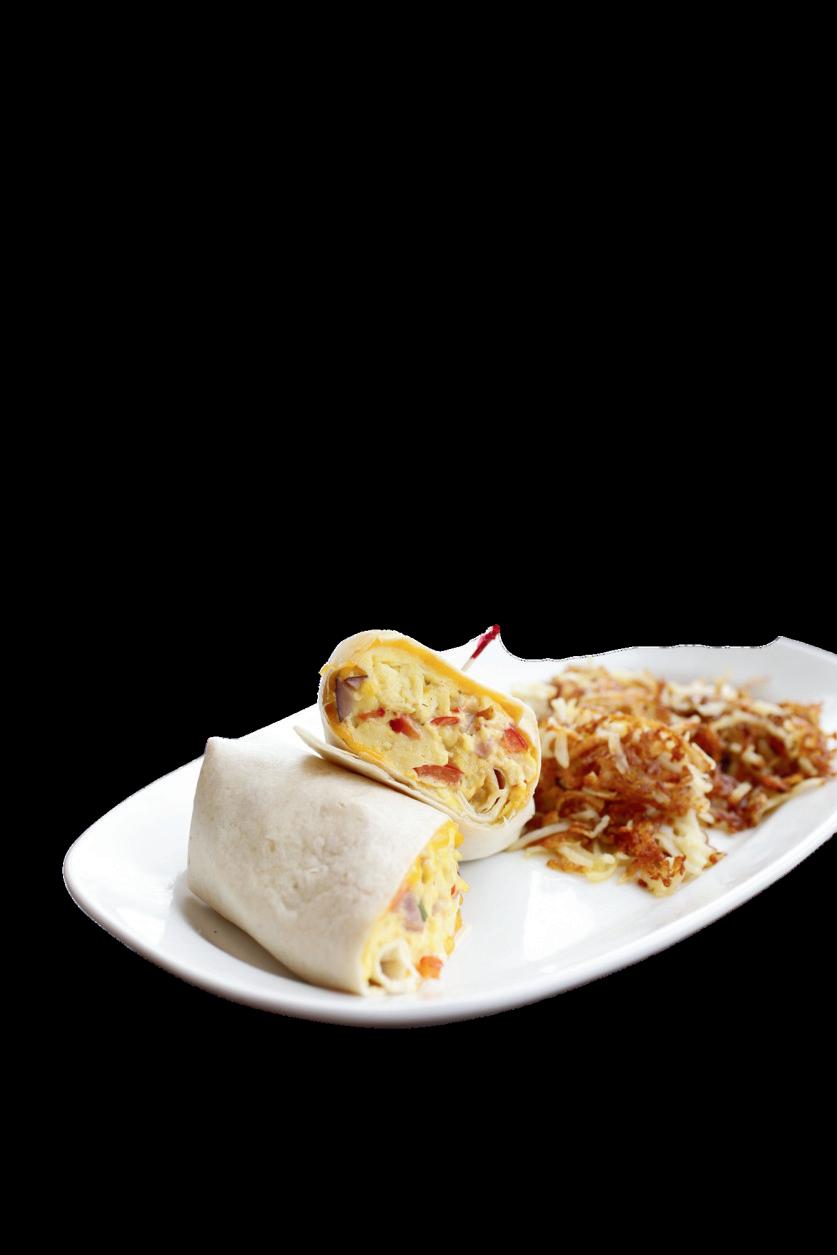



drink dine. play. WEEKLY AND FUN GUIDE Dine-in, carry-out & delivery! VIEW OUR MENUS & ORDER ONLINE Open Daily, from 7a to 2p! Now Open at NIGHT - Sat & Sun, 4p - 10p RILEY HERRON | MANAGING SPORTS EDITOR | SPORTS@STUDLIFE.COM 8 STUDENT LIFE THURSDAY, MAR 7, 2024
JIALING SUN | STUDENT LIFE
Sidney Rogers plays against top-ranked New York University








































